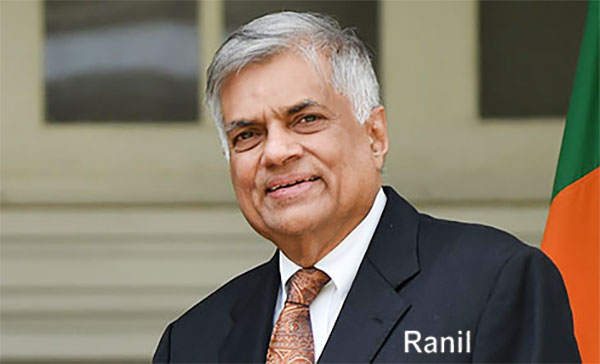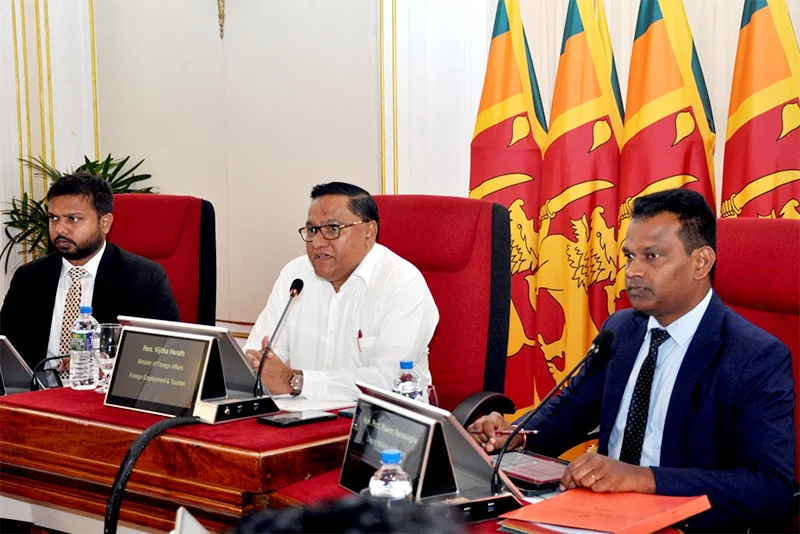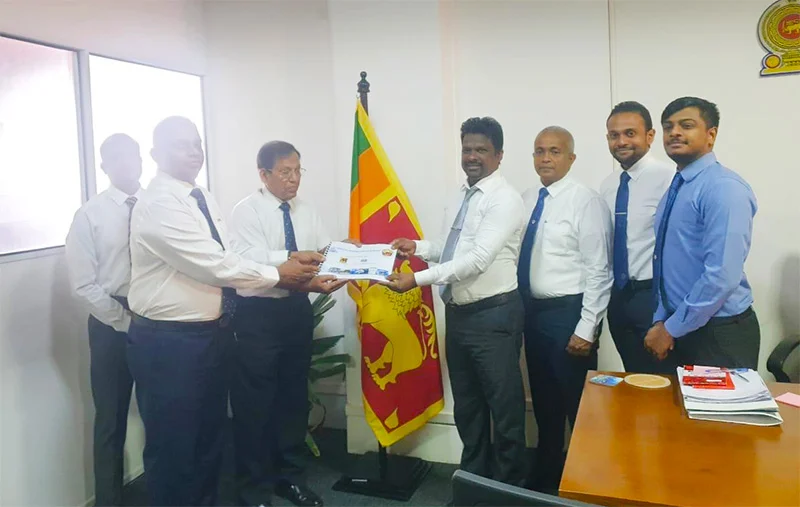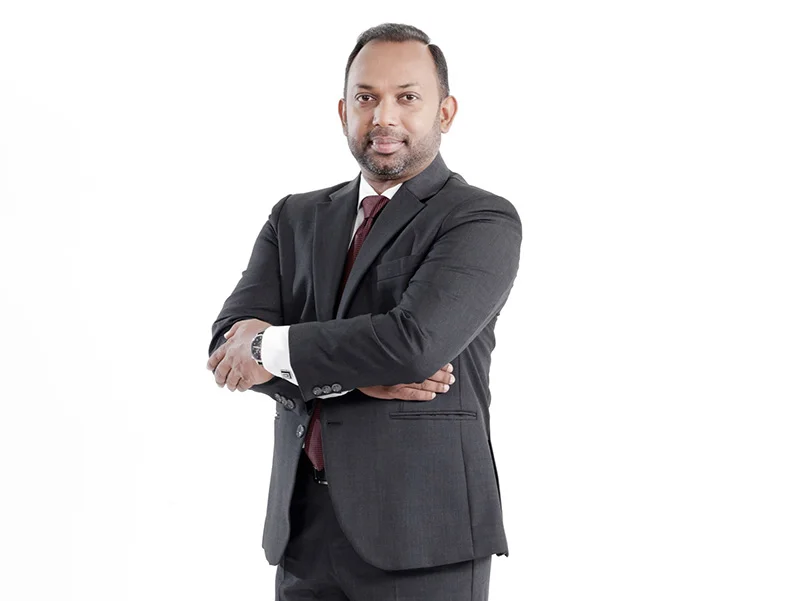Business
Ranil says Sri Lanka paying the price for not addressing structural issues

“An all- party economic model, if ever, will take 20 years to achieve prosperity’
by Sanath Nanayakkare
People of Sri Lanka have to face the effects of strenuous economic conditions as the country has virtually exhausted its foreign currency reserves that were there when the present government came to office, MP and former prime minister Ranil Wickremasinghe said during an interview with an Indian multinational English language news channel (WION) recently.
“The country was caught unawares in the Covid pandemic at a time the government was pursuing a non-fiscal consolidating budgetary stance providing tax subsidies to the corporate sector depriving the country of its revenue, and dropping several infrastructure investment opportunities with countries such as India, Japan and the USA,” he said.
“The government cancelled most of the agreements we had with other countries to boost investment in critical infrastructure; the Trincomalee Oil Tank farm deal – which they have now restored – two LNG plants with Japan and India, East Container Terminal project with India, the Central Highway Phase 3 and 4 with Japan and India, MCC compact with the United States that would have brought Sri Lanka investments worth about USD 4 billion which would have helped us mitigate the present economic crisis,” he said.
Responding to a question on Sri Lanka’s economic diplomacy and whether Sri Lanka was favouring China than other countries, he said that at the end of the day, Sri Lanka is not really friendly with any country.
“China, Sri Lanka relations were under strain following the fertiliser issue and I am told that there are issues in other projects as well. At least now we are talking to the Chinese government. Then there is the strained relationship with India, Japan, USA and the EU. These countries are donor countries and we need to be mindful of the fact that with the West we have a great trade balance in our favour.”
“Then there was the IMF stand-by facility of USD 400 million which I think we didn’t take. At that time, we were completing an IMF programme and we could have renewed it. I don’t know where the government thought the foreign currency would come from. Seemingly they thought countries would willingly offer foreign currency to Sri Lanka.”
When asked whether the current crisis had been in the making since the time he was prime minister, he said, “No, it was not in the making at that time. We had problems from time to time, but an economic crisis was not in the making. I don’t want to delve too much into the past. In 2015, We did have a problem in terms of debt repayment. But by 2017, we were able to build a surplus in the primary account for the first time after about 60 years. And we were building upon it. Then again, despite problems in 2019, the economy was doing fine. There was a setback, but we picked up in the six months that followed. So, it wasn’t the period of time when the problems began. Problems began when the present government reduced the value added tax (VAT). During our time, the budgetary position improved because we increased the VAT. By reducing the VAT, the government deprived the national coffers of the revenue that was required to maintain a surplus. Secondly, Sri Lanka was quite unprepared for an external shock like Covid-!9 pandemic. Our economy should have been prepared for external shocks. We should have gone to the IMF and spoken with them to put the IMF facility back on track as we were finishing up the one we had been given at the time. We didn’t do that. The government just carried on. If we had spoken with the IMF, we wouldn’t have ended up here.”
When asked why the government was so hesitant or even adamant about not going to the IMF, he said,” I don’t really know. It seems that they have some misconceptions about the IMF; that the IMF would ask the government to reduce employees in the public sector. From the experience I have had with the IMF and the World Bank. I don’t think that they would have asked us to reduce employees in the public sector. Today they have formed a consortium and Sri Lanka is not part of it.”
“Maybe the government is not going to the IMF because the people who formed Viyathmaga and other groups are against economic reforms, restructuring, opening out, dealing with India, obtaining MCC funds etc. It appears that they didn’t want to get something done when it was opportune to do so. And now we are paying the price for it.”
When asked if the government was doing the right thing by taking ‘extreme’ moves such as selling more than half of the Central Bank’s gold holdings, enforcing US dollar conversion rules etc, he said,” No, They are not. There are some fundamental issues in the economy. We have to address them. If you don’t address them, the current moves will not be sufficient. We have the issue of our dwindling foreign exchange reserves and the decline in revenue against expenditure. There is about a trillion rupee gap there. Then there are other issues as we go along. One of them is, by 2035 we may not have money to pay pensions of our government employees. You have to deal with such scenarios starting right now. This is one reason that we have to put the economy back in order so that we will have the capacity to face such challenges in the future. Then what about expenditure needed to tackle issues arising from Climate Change? Now all these have culminated in a crisis which can’t be resolved in a day or two. We have to go deep into these issues and make policies for long term solutions.”
“If all major political parties in Sri Lanka can come to an agreement on the economic fundamentals to be pursued with consistency, the country and its people can achieve growth and prosperity in 20 years. There is no short-term solution to the current economic crisis,” he said.
When asked about reasons for the UNP’s worst-ever defeat in history and its future direction, he said “The UNP wasn’t prepared for the 2019 presidential election.
As far as I was concerned, I wanted to contest the parliamentary polls as a united team because then we would have had a chance to make our presence felt in parliament and prevent the government from getting a two-thirds majority. But there was a different feeling in the party and Sajith Premadasa and others wanted to depart from the UNP and contest. When you look at the election results analytically, both SJB and UNP got some 2 million votes. We came down to some two million votes from about 5.4 million votes. And now, post-Covid, I think that the major parties’ vote bases have disappeared – both of the government as well as ours. The UNP also has to build up a new vote base. We have done a survey and found what the people want. We are re-organising the party in a more professional way. We are making an effort to bring in young professionals to the party. Most of our senior leaders have retired, so we have the opportunity to open our doors to the young people. We will expose them to the right kind of training and there will be new faces in the UNP in the coming few months.”
Asked when he would hand over the reins of the party, he said,”Whenever they are ready. They are just coming in. They can have it when they want it.”
When asked about the government’s wish to restructure its Chinese debt and whether he thought it could be done, he said, “I read that Sri Lanka has raised this concern about restructuring its Chinese debt. In such a context, China could be urged to restructure debt on many countries on the Belt and Road initiative. You can’t restructure debt of one country and not of others. I can’t see that taking place. And I don’t think there was enough time during the Chinese foreign minister’s recent visit to Sri Lanka to discuss matters of that nature.”
Asked about his potential candidacy at the next presidential election, “Earlier you asked when I was going to hand over the reins to young members of the party and now you ask whether I would be contesting the next presidential election,” he quipped.
“Frankly speaking, I have only given my views on how the economy should be handled. I feel that we have to have a common economic plan. All major parties must agree on its fundamentals. The major parties in India despite their differences over the farmers’ issue, won’t move away from their core economic model, no matter whatever their differences. We also have to agree on a common economic model like that and how we are going to come out of this crisis, regain stability and achieve growth. That is what I have always advocated for. If such a common model is pursued for 20 years, we can achieve real growth. The current crisis can’t be sorted out in a day or two.”
Asked what should be the government’s plan at this juncture, the UNP leader said that the government would have to make up their mind to have a plan in the first place and talk to everyone.
Asked if the Opposition would support such a plan, he said, “They should present a plan. If there is a solid plan, I think the Opposition will support it. Today even the cabinet ministers are saying that there is no plan,” he said.
When asked if Sri Lanka should convene the BIMSTEC member states – Bangladesh, Bhutan, India, Myanmar, Nepal and Thailand as its current Chair to discuss the matter of Myanmar’s ousted civilian leader Aung San Suu Kyi jailed for four more years, the UNP leader said,” I raised this matter in parliament and asked if we could discuss it privately and not in public, but I didn’t get a reply. The predominant concern that remains is whether Sri Lanka would go to the IMF let alone BIMSTEC,” he said.
Business
Foreign Minister defends India pacts, sidesteps transparency demand

In a press conference marked by both clarity and pointed omission, Foreign Affairs and Tourism Minister Vijitha Herath, yesterday offered a robust defence of two controversial bilateral agreements with India but conspicuously avoided committing to tabling their full texts in Parliament.
The minister’s appearance, billed as a year-opening briefing, took a sharp turn when questioned on the strategic implications of the India-Sri Lanka Defence Cooperation Agreement and Sri Lanka’s acceptance of the Indian Pharmacopoeia.
“No Indian military camps on our soil”
Responding in Sinhala to a question posed in English, Minister Herath moved first to allay what he suggested were widespread misapprehensions about the defence pact.
“This agreement is especially for data and information exchange purposes regarding drug trafficking, drug mafias, human trafficking, and any terrorist activities that could threaten regional security and peace,” Herath stated.
He emphasised that it would also facilitate “various support related to the defence sector.”
In his most definitive assertion, aimed at quieting a persistent national anxiety, the Minister declared: “We must clearly say that there is no plan or possibility of setting up Indian defence camps on Sri Lankan soil.” He categorised the pact not as a “defence agreement” but a “defence cooperation agreement in its real sense,” claiming it creates an “advantageous position” for Sri Lanka.
He linked recent post-‘Ditwah’ cyclone disaster support from India, as well as U.S. aerial support during recovery efforts, to the frameworks established by such cooperation agreements, arguing they have proven beneficial.
Indian Pharmacopoeia: A reputation-based advantage
On the equally contentious acceptance of the Indian Pharmacopoeia – a standard synopsis for drug manufacturing – Minister Herath framed it as a logical step that formalises existing practice.
“We already import a significant share of medicines from India,” he noted. The agreement, he explained, signifies the acceptance of medicines exported by a “reputed Indian pharmaceutical company” approved by its national regulators.
He assured the public that Sri Lanka’s National Medicine Regulatory Authority (NMRA) will continue to remain the monitor. “By entering into this, no disadvantage will happen to us. Only an advantage will happen… it will only be beneficial to us,” he emphasised.
The unanswered question
Despite the detailed assurances, the Minister pointedly ignored the final and arguably most critical part of the question posed by The Island Financial Review : whether the government would table the full text of the two agreements in Parliament for transparent debate and discussion.
This omission is likely to fuel further controversy, as opposition parties, civil society groups, and independent analysts have repeatedly demanded full parliamentary scrutiny, arguing that agreements touching on sovereignty and public health mandate the highest level of public transparency.
Tourism Pride
Shifting to his tourism portfolio, Minister Herath struck an optimistic note, citing record tourist arrivals and foreign remittances in 2025 as a sign of resilient recovery post-Ditwah.
The conference also touched on global affairs. When asked about the U.S. arrest of Venezuelan President Nicolás Maduro, Herath presented a nuanced governmental position. He stated that while his party, the JVP, condemns the action, the government’s official stance is to urge respect for national sovereignty in line with the UN Charter – a reflection of the coalition’s delicate balancing act between ideological roots and diplomatic pragmatism once in governance.
Minister Herath’s explanations provide the government’s clearest public rationale yet for the India agreements, directly confronting fears over militarisation and pharmaceutical quality. However, the deliberate sidestepping of the transparency query left a communication deficit at the heart of the press conference.
High-stakes diplomacy
It reflected a perception that while the administration is willing to defend its policy outcomes, it remains reluctant to subject the processes of high-stakes diplomacy to the full glare of parliamentary and public scrutiny. As these agreements continue to shape Sri Lanka’s strategic and health landscape, the call for their full disclosure is now accompanied by a louder question about the government’s commitment to open governance.
by Sanath Nanayakkare
Business
‘Vehicle-Testing Can Save Lives’

Automobile Association of Ceylon (AAC), in collaboration with the Federation Internationale de L’ Automobile (FIA) and under the UN Decade of Action for Road Safety has been consistently engaging in road safety enhancement programs for all citizens of Sri Lanka.
Current data indicates that while over 08 million vehicles are registered in the country, only heavy vehicles (less than 20% of the vehicle population) are subjected to compulsory road-worthiness tests.
Fatal accidents due to technical failures in vehicles are on the rise and the damage to lives and property is severe.
We also understand that there is a death every three hours and eight deaths per day in road accidents. This amounts to nearly 3000 deaths in road accidents per year.
AA of Ceylon has launched the “Vehicle Testing can Save Lives” project with the advice and support given to execute our campaign by the Minister of Transport, chairman, National Council for Road Safety (NCRC), Deputy Inspector General of Police (Traffic Division), Dr. Indika Jagoda, Deputy Director (Accident Service), National Hospital, president, Lions Club of Boralasgamuwa, Metro(Lions Club International – District 306 D 2) and other stake-holders to find a workable, low / cost solution for mandatory vehicle testing in Sri Lanka.
Therefore, this project aims to educate the public on the necessity of checking essential safety features in all vehicles and the benefits of same to all road users.
AAC has therefore respectfully requested Anura Kumara Dissanayake, President of the Democratic Socialist Republic of Sri Lanka, to consider implementing the proposal we have submitted to him, to minimize fatal accidents, injuries to people and damage to vehicles and property due to road accidents and to also implement a rule to have compulsorily road-worthiness checking of all vehicles. (AAC)
Business
INSEE Lanka appoints new Chief Executive Officer

Siam City Cement (Lanka) Limited (INSEE Lanka) has announced the appointment of Eng. Thusith C. Gunawarnasuriya as its new Chief Executive Officer, effective 01 January 2026. He succeeds Nandana Ekanayake, who will continue to serve as Chairman, ensuring leadership continuity and strategic stability for the organisation.
A long-standing contributor to INSEE’s journey, Thusith has worked with the company through its evolution under Holcim (Lanka) Ltd, LafargeHolcim and INSEE, playing pivotal roles that influenced both operational progress and strategic direction.
Rejoining INSEE Lanka in January 2025 as Chief Operating Officer, he has since demonstrated exceptional leadership, driving topline growth, improving EBITDA performance, and strengthening talent development initiatives that enhanced organisational capability and business outcomes.
His expertise in business strategy, operations excellence, and supply chain transformation is well-recognised, supported by over 25 years of multi-industry and multi-country leadership experience. His career includes senior positions at Lion Brewery (Ceylon) PLC, Hemas Manufacturing, Fonterra Brands Lanka, GlaxoSmithKline, MAS Active, and DMS Software Engineering. His international exposure spans India, Bangladesh, and Thailand.
Thusith is a proud alumnus of Dharmaraja College, Kandy, and holds a BSc (Hons) in Electrical & Electronic Engineering from the University of Peradeniya, an MBA from the University of Colombo, and an MSc in Business & Organizational Psychology from Coventry University, UK. He has completed executive leadership programs at IMD (Switzerland) and the National University of Singapore. He is also a member of IEEE (US), CILT (UK), ISMM (Sri Lanka), and IESL (Sri Lanka).
Chairman’s Quote – Nandana Ekanayake:
“Thusith’s deep understanding of our business, strong operational mindset, and proven leadership make him the ideal successor to lead INSEE Lanka into the next phase of growth. His experience within INSEE and across multiple industries, positions him well to deliver on our long-term ambitions and uphold the values that define the organisation.”
-

 News1 day ago
News1 day agoPrivate airline crew member nabbed with contraband gold
-

 News3 days ago
News3 days agoHealth Minister sends letter of demand for one billion rupees in damages
-

 News6 days ago
News6 days agoLeading the Nation’s Connectivity Recovery Amid Unprecedented Challenges
-

 Opinion5 days ago
Opinion5 days agoRemembering Douglas Devananda on New Year’s Day 2026
-

 Latest News1 day ago
Latest News1 day agoCurran, bowlers lead Desert Vipers to maiden ILT20 title
-

 News6 days ago
News6 days agoDons on warpath over alleged undue interference in university governance
-

 Features1 day ago
Features1 day agoPharmaceuticals, deaths, and work ethics
-

 News1 day ago
News1 day agoBellana says Rs 900 mn fraud at NHSL cannot be suppressed by moving CID against him













